Introducing our New Pro Bono Counsel and Her Reflections from the ABA Commission on Immigration (COI) Pro Bono Week at ProBAR
- August 2023
Lindsay Schenk reflects on her new position as Pro Bono Counsel at ProBAR, and the ABA Commission on Immigration Pro Bono Week

I would like to start out by introducing myself as the new Pro Bono Counsel at ProBAR and thanking ProBAR Leadership and the ABA Commission on Immigration for this exciting opportunity. Before starting as Pro Bono Counsel on May 22, 2023, I worked at ProBAR for over three years as a HIAS Border Fellow. During this time, I provided legal services to people in the first and second versions of the Migrant Protection Protocols program who were forced to wait in Mexico for their immigration court hearings, and to people in Mexico seeking to enter the U.S. through humanitarian parole. I also provided legal services (and continue to do so) to people navigating immigration court removal proceedings in Harlingen, Texas. In my new role as Pro Bono Counsel, I am excited to work on increasing access to legal representation and creating opportunities for volunteer engagement by spearheading new pro bono programs at ProBAR.
Already I have had a chance to see the impact pro bono attorneys have for ProBAR’s clients. My first week as Pro Bono Counsel coincided with the ABA Commission on Immigration (COI) Pro Bono Week at ProBAR. And what an inspiring week it was! The eight Pro Bono volunteers brought with them an endless energy to engage in numerous learning experiences – which were not always easy, such as the trip across the border to Matamoros, Mexico. The volunteers also conducted a total of 26 individual legal orientations in various locations: an immigration detention center, two temporary respite shelters, and a hospital. Individual legal orientations included eliciting information that involves trauma and fear, and in some cases, assisting the asylum-seeker to articulate the trauma in an organized way. That is never easy, but it is crucial to effectively present their case to adjudicators.
The volunteers made a significant difference that week. Bonnie Fought, ABA Commission on Immigration (“COI”) Advisory Committee member, and Meredith Linsky, ABA COI Director, met with a Venezuelan man in a local hospital, whose leg was amputated after he sustained critical injuries resulting from a tragic car crash. This young man was one of many survivors of a crime committed on May 7, 2023. In this incident, a driver ran a red light and crashed into a large group of migrants, mostly from Venezuela, waiting for a bus on a sidewalk in Brownsville, Texas.
Bonnie and Meredith met with this man to gather information and began preparing an application for a U visa, immigration relief available to certain crime victims in the United States: Bonnie describes her experience:
“I visited with him in the hospital and felt his dismay with the U.S. immigration system when we told him that it would likely take years for him to receive a U Visa. It was frustrating for me to watch him struggle with the basics of everyday living, like how to get out of bed and move around on one leg, knowing that he would also face the unnecessarily daunting U.S. immigration process on top of trying to rebuild every aspect of his life.”
There is more. Volunteers also assisted 12 individuals in ICE detention to prepare for either a Credible Fear Interview (CFI) or an Immigration Judge’s review of an asylum officer’s negative findings for the CFI. A CFI is a critical first step in the asylum process for someone who has recently crossed the border. After they express a fear of return to their home country, an asylum officer holds a CFI by phone to assess the fear. A positive CFI means an opportunity to present their case in court, while a negative CFI often means deportation. After the volunteers’ assistance, at least five individuals received positive results and will have an opportunity to pursue their cases. The volunteers also realized an important error in the dates on some immigration documents that would render certain individuals not eligible for asylum. In addition to conducting CFI preparations, Melissa Crow, Ilyce Shugall, and Camila LeMaster Esquivel educated individuals on the importance of advocating for necessary corrections to be made and potentially life-saving eligibility for asylum to be preserved.
As another example, ABA COI Committee Member Melissa Crow and ABA COI Program Specialist Katie Sheridan met with a Haitian couple at a shelter, La Posada Providencia, to discuss the couple’s situation. Soon after entering the U.S., the wife gave birth to their first child. The baby was born prematurely and remained in the hospital. The couple had problems obtaining the birth certificate of their baby. Melissa and Katie investigated the process and ensured that the parents obtained the birth certificates. The family is now in Boston, Massachusetts, and ProBAR is looking for pro bono attorneys in Boston to represent this family in immigration proceedings.
To learn more about the ABA COI Pro Bono week from volunteers at different stages in their careers, I highly recommend reading the following: Law Student Liaison to the ABA COI, Camila LeMaster Esquivel; ABA COI Member Honorable Ilyce Shugall; and ABA COI Advisory Committee Member, Professor Stacy Brustin.1
Pro bono is also an area where collaboration and connections are invaluable. Since the horrific May 7 incident described above, ProBAR has provided legal assistance to survivors and has made referrals of some of these cases to pro bono attorneys. While we still have numerous cases that we hope to place with pro bono attorneys for legal representation, we are incredibly grateful to private law firm Akin for accepting three cases of individuals in the Rio Grande Valley for full legal representation, and free legal service provider Legal Aid Chicago for accepting five cases of individuals in the Chicago area as clients. We also appreciate private law firm Vinson & Elkins’ support in curating important information to share with survivors and witnesses.
Meanwhile, we continue to identify people with varying legal needs for pro bono referrals. On behalf of ProBAR, I would like to express our gratitude to legal service providers Immigration Institute of the Bay Area (IIBA), and Catholic Charities of Dallas, Texas for their support. Each organization has recently accepted a referral of a former ProBAR client who is now located in their geographic area. IIBA will represent a man in his immigration court proceedings, who was previously in the second Migrant Protection Protocols. Catholic Charities requested the release of a man in detention who suffers from health problems.
If you find yourself motivated to get involved, please do not hesitate to email me. My email address is [email protected]. Please also feel free to fill out our Pro Bono Form. We anticipate there will be a combination of in-person and remote opportunities, some for representation and others for pro se assistance.
1 – Please note that policy and advocacy arguments are the opinions of the writer.

